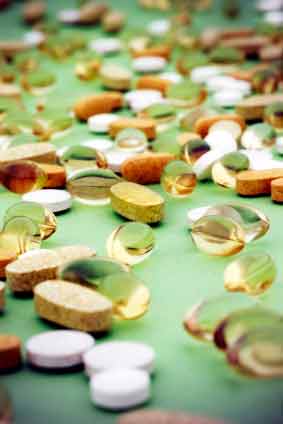Mega-Dose Vitamins Therapy
Safety of Nutritional Supplements
There was not even one death caused by an dietary supplement in either 2008 or 209, according to the most recent information collected by the U.S. National Poison Data System (NPDS). The annual report of the American Association of Poison Control Centers shows zero death from multiple vitamins; zero deaths from any of the B vitamins; zero deaths from vitamins A, C, D, or E; and zero deaths from any other vitamin. Sixty poison centers provide coast-to-coast data for the NPDS, which is then reviewed by twenty-nine medical and clinical toxicologists.

Over half of the U.S. population takes daily nutritional supplements. Even if each of those people took only a single tablet daily, that makes 154,000,000 individual doses per day, for a total of over 56 billion doses annually. Since many persons take more than just one vitamin or mineral tablet, actual consumption is considerably higher, and the safety of nutritional supplements is all the more remarkable.
If nutritional supplements are allegedly so “dangerous”, as the U.S. Food and Drug Administration and news media so often claim, then where are the bodies? Those who wonder if the media are biased against vitamins may consider this: how many television stations, newspapers, magazines, and medical journals have reported that no one dies from nutritional supplements? Consumers are not getting a fair picture of vitamin safety and efficacy from government-sponsored sources, particularly the National Institutes of Health. However, when they do have all the information, consumers see that vitamin supplements are far safer than drugs.
Vitamin supplementation is not the problem. It is under-nutrition and over-medication that are the problems. Vitamins are the solution.
Vitamin Controversy
“Vitamin-bashing” news media articles are typically based on studies with faulty design whose conclusions were preordained. One example is the meta-analysis, which is not new research but instead a review of existing research. It is not a clinical study, but rather a statistical look at a collection of studies. If you analyze enough failed studies, you will get a negative meta-analysis. If you exclude enough successful studies, you preordain the conclusion.
Proving Effectiveness
Low-dose vitamin studies are the ones that get negative results. Most vitamin research is low dose. You cannot test the effectiveness of high doses by giving low doses. Any time nutritional research employs inadequately low doses of vitamins – doses that hundreds of orthomolecular physicians have already reported as too small to work – vitamin therapy will be touted as “ineffective”. You can set up any study to fail. One way to ensure failure is to make a meaningless test, which is assured if you make the choice to use insufficient quantities of the substance to be investigated.
Proving Safety
One reason commonly offered to justify conducting low-dose studies is that high doses of vitamins are somehow dangerous. They are not. There are those who may not believe this next statement, but it is not a matter of belief – it is a matter of fact: there is not even one death per year from vitamin supplements. However, there are at least 106,000 deaths from drugs each year in the U.S., even when taken as prescribed. This may be a low estimate.
Eliminating Bias
It is ironic that critics of vitamins preferentially cite low-dose studies in an attempt to show lack of vitamin effectiveness, yet they cannot cite any double-blind, placebo-controlled studies of high doses that show vitamin dangers this is because vitamins are effective, and safe, at high doses. Health professionals and other interested persons are invited to personally search the literature for evidence of deaths caused by vitamin supplement s- you will not find any.
Summary
Decades ago, the mantra of the nutrition “experts” was “eat a balanced diet”. What foods were being balanced were inadequately described, but they were deemed sufficient. Extra vitamins were said to “just make expensive urine”. Vitamins can do so much more than preventing deficiency disease, which requires very low amounts. “Megadoses”, used properly, can accomplish wonders. We have defined a healthy diet, which forms a base for health, but factors such as availability and cost may prohibit achieving it. While working toward that ideal, we also must fill in the gaps with supplementation of vitamins and other nutrients. The further away one is from eating a good diet, the greater the need for supplementation, not to substitute for but to augment. Nutritional supplements are safe and effective for children.
Change your family’s dietary lifestyle and you dramatically improve your health. “That’s so simplistic!” rails our inner critic. We doubt natural therapy because it’s too simple to work and we doubt self-care because we doubt ourselves. We’ve been educated to be good consumers, and that includes becoming consumers of health-care services. We have not been educated to be self-reliant.
The good news is that therapeutic nutrition is cheap, simple, effective, and safe. Of course, we have been taught that anything cheap, simple, and safe cannot possibly be effective against “real” diseases. And when, by our own verified experiences, we find that megavitamin therapy is cheap and effective, we have pharmaphilic fear-mongerers trying to tell us that it can’t be safe.
Ultimately, we have to decide who we are going to listen to. Read the research for yourself and see for yourself. Everything changes the day you decide to no longer let your health-care providers treat you like a child. At first, it may not be easy to face down a domineering doctor or even to negotiate compromises with a family member. It is not easy to bring yourself to read the research, and it takes some gumption to try high-dose vitamin therapy for the first time. Until you see how well it works, that is. And then, with experience, it becomes easier. We do not need to fear illness – we need to learn what to do to avoid it and to fly out of it in one piece when it is suddenly upon us.

